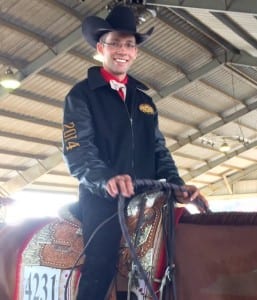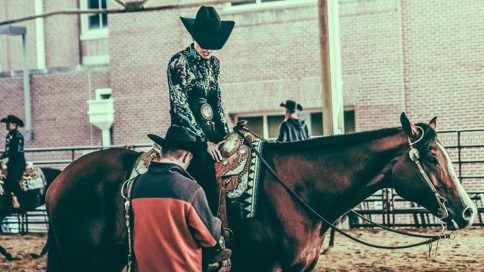Working under some of the top trainers in the business as an assistant trainer can be a tough, yet extremely rewarding career for many individuals. Learning from the best in the business and completing the grunt work along the way, these people have dedicated their lives to the horse industry. There are good and bad days but they continue to work hard and never give up on reaching their goals. Here are ten tips on being a successful assistant trainer.
1. Work for the Right Person
It has been said time and time again, that every great leader is a great teacher. Working under the right program and boss can make or break an assistant trainer’s future. If there isn’t an opportunity or willingness to help you learn, you won’t get very far in this business.
“Look for a job with a person who has had success in the show ring; has a good business and clients; as well as a lot of respect within the industry,” says Aaron Moses, an assistant to Gil Galyean of Purcell, Oklahoma, “And don’t be afraid to reach for the best available!”
Moses suggests to find a job with a person who has not only been successful themselves, but also consider how successful their past assistants have been. This can give you an inside look at the quality of education you will be receiving.
2. Make a Commitment
 You won’t become a successful horse trainer overnight. It takes more than a few months or a year to master a program and be ready to pursue a training business on your own. Make a commitment to staying an assistant until you develop the skills required to be able to successfully own and operate your own training barn.
You won’t become a successful horse trainer overnight. It takes more than a few months or a year to master a program and be ready to pursue a training business on your own. Make a commitment to staying an assistant until you develop the skills required to be able to successfully own and operate your own training barn.
“There’s a reason it takes eight years of school after high school to become a doctor and I don’t think learning to train a horse is much different,” states Moses (pictured right). “It takes a long time to learn to do something well as well as leaning the ins and outs of the business.”
New assistants shouldn’t expect to come into a program and begin riding and showing the great horses. Expect to be completing a lot of the grunt work throughout your day. But if you work hard and put in the long hours, your hard work could pay off big time!
3. Pay Attention to the Details
 One of the most important things about showing horses is the details. Every single piece must be put together perfectly and it is the trainers, and therefore the assistant trainers, job to make sure everything is the way it should be, whether they are at a show or at home.
One of the most important things about showing horses is the details. Every single piece must be put together perfectly and it is the trainers, and therefore the assistant trainers, job to make sure everything is the way it should be, whether they are at a show or at home.
“Even the smallest details are what make the whole operation run smoothly,” reveals Emma Bates (pictured left), assistant trainer to Gary and Kelly Roberts of Murrieta, California, “Pay attention to everything; from where your boss keeps his/her stirrups to things such as a number that might be crooked on a customer’s back at a show.” Your employer will notice your attention to details and appreciate how much you value your work.
4. Develop a Tough Skin
The horse industry is tough. Because of its high intensity nature, stress levels are at the ultimate max, especially when it comes to horse shows. Horse shows are a “beast” and can put the trainers and clients in tough situations. Emotions are on high and that can cause hurtful comments to be said in the heat of the moment. Developing a tough skin for those situations is key to your survival in this industry.
 “There are good and bad days, ups and downs. You need to be able to let things roll off your back and keep moving forward,” states Jessica Ross (pictured right), an assistant trainer at Powder Brook Farm in Harwinton, Connecticut. “If you want this bad enough, you will learn to move full steam ahead. Keep coming back for more and never give up.”
“There are good and bad days, ups and downs. You need to be able to let things roll off your back and keep moving forward,” states Jessica Ross (pictured right), an assistant trainer at Powder Brook Farm in Harwinton, Connecticut. “If you want this bad enough, you will learn to move full steam ahead. Keep coming back for more and never give up.”
An assistant trainer is sometimes the person that takes the heat in tough situations. Most of the time it isn’t personal, but sometimes it is hard to see it that way. Developing a tough skin can save you from unnecessary heartache. However, make sure you own up to your mistakes no matter the consequences.
5. Take Initiative
One of the best qualities of a successful employee in any industry is having initiative to get things done. In the horse world, being the person that goes the extra mile will get you far. Make sure that you show up early to work every morning and sooner than later your employer will notice.
Always remember that sitting around at a horse show or at home with “nothing to do” will make your employer feel like they have to hold your hand all day. There is never “nothing to do,” especially when it comes to being at a horse show. If you notice a crooked number on an exhibitors back, fix it right away. If the tack room is looking a little messy, sweep it up. Your employers will thank you and you might even be able to get to bed earlier if you notice what needs to be done and take charge in making sure that it gets done.
6. Have Personal Goals
What do you want to do when you grow up is a question asked thousands, if not millions of times when you were growing up. Most people are really just asking you what your personal goals are for yourself and how you plan on achieving them. When looking for an assistant trainer position, look for a job that can aid you in obtaining your personal goals. Look to work for someone who you share commonalities with you such as goals, principles, foundations, etc.
Ross suggests that keeping an open line of communication with your employer about your goals and needs from your job can go a long way. “Never lose sight of yourself or where you are headed and what your end goal is. To do this well, you have to feel you are getting what you need out of it,” expresses Ross, “It requires so much heart and soul you really need to be open and upfront about all of that.”
7. A Good Attitude Goes a Long Way
There are many different aspects to being a horse trainer. Being a successful horse trainer is more than just riding, and as an assistant you will probably end up doing a lot of things you don’t enjoy. Your attitude towards your work goes a long way, and how you handle the dirty work can separate you from the rest. “Keep an attitude that you are just happy to be there with an opportunity to learn from your employer whether you are riding, saddling for everyone else, cleaning stalls, fixing a fence or mowing the lawn,” Moses expresses.
You need to remember that your employer is taking time out of his/her day working with you and your horses while also having their own. Having a poor attitude about the daily grind can make your employer extremely unhappy, and if they have to end up doing it themselves that is less time that they have to get the things they are responsible for done.
“Your time will come to ride and show but you have to be willing to do whatever it takes especially at first,” reveals Moses.
8. Respect Your Boss
This should be the ultimate no brainer. Respecting your employer and the way that they run their business is how you stay employed. Make sure that when communicating with your employer, you are communicating professionally and with a level of respect. You may disagree with ways your employer chooses to handle certain situations, however you need to respect their decision as they are the head honcho.
If you strongly morally disagree with a situation that happens while working, respectfully give notice of your leaving and find a better program that fit your needs. Never leave a job on bad terms and absolutely do not talk bad about the trainer behind their backs, especially with their clients.
9. Live and Love the Lifestyle
To be successful in this industry it has been said that you need to eat, sleep and breathe horses. This industry is not a job, it is a lifestyle that takes over your entire life. To become a successful assistant you have to be able to see yourself in this business long term. If you don’t, you may find that you become burnt out within a few years.
“I believe it is one of those jobs that to truly do well and to the best of your ability, you have to be head over heels, crazy in love with it,” conveyed Ross. There are the good, the bad and the ugly days but you have to remember why you chose to become a horse trainer. If you can’t see yourself at a horse show every weekend, or getting up early mornings and having long nights maybe this isn’t the job for you.
“I think to succeed in anything you have to put the time in, always be honest with yourself and no matter what stay true to yourself as a person and as a horse trainer,” says Ricky Noiseux, an assistant at Powder Brook Farm.
10. Always Watch, Listen & Learn
The best part about being an assistant trainer is getting to learn from the best! Take every opportunity to watch, listen and learn from your employers and other trainers at shows. Pay attention to who is winning and why. What makes that trainer stand out more than others? Is it the way that he/she treats her clients? Do they have a method for changing leads that is better than yours?
“I think it is important to watch your boss and other trainers ride,” states Bates, “and be prepared to make improvements or ask for help.” The biggest thing with the horse industry is that it is ever changing. When you observe your boss or others ride, you are strengthening your own skills.
Keeping an open mind is something that Ross strives for every day. “There is so much to learn in this business from such a variety of people. Always listen and take from each person what you can,” Ross expresses, “It may not fit you at that moment in time, but it may be something you use further down the road.”









